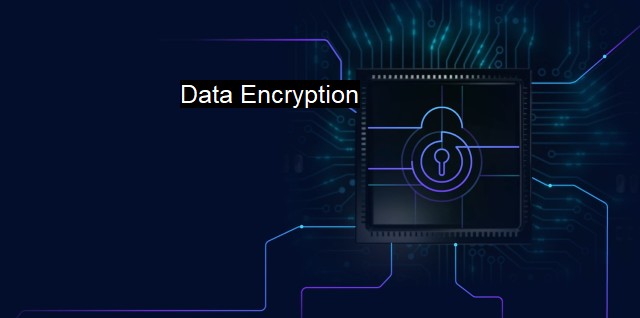What is Data Encryption?
Data Encryption: The Essential Tool in Cybersecurity to Protect Valuable Data from Theft and Unauthorized Access
Data encryption is a fundamental concept within the realm of cybersecurity and antivirus solutions. It is essentially a method of securing valuable information or data by converting it into a non-readable format or a code (commonly referred to as "ciphertext") so that it can be transmitted across insecure networks without the risk of data breaches. Only users or systems who have the appropriate decryption key can convert the encrypted data back into a readable form or "plaintext".Fundamentally, the purpose of data encryption is to protect the digital data confidentiality during its storage within data centers or transmission across networks. This process enhances the security of data by mitigating the risk of unauthorized interception. Without the correct decryption key, individuals or systems cannot understand or manipulate the data they intercept.
Encryption plays a particularly crucial role in areas such as financial transactions, email accounts, healthcare records, corporate data, and other repositories of sensitive information. Modern businesses now hold vast databases filled with sensitive customer information, making encryption an essential tool for ensuring their reputation and compliance with regulations.
Various encryption methods manage to scramble your data into a labyrinthine code that is undecipherable without the appropriate decoding mechanism. Two primary encryption methods are symmetric and asymmetric encryption. Symmetric encryption implements a single key that is used for both encryption and decryption processes, while asymmetric encryption uses a pair of keys where one public key encodes the message, and a separate, private key decodes it.
As part of modern cybersecurity measures, data encryption is paramount in antivirus programs. While the main job of an antivirus solution is to detect and remove malicious software, they also compile and store sensitive information as they scan your device. Real-time data such as passwords, financial information, and other personal details need to be safeguarded against data breaches. Antivirus programs use encryption to protect this data from falling into unauthorized hands. Hence, it is always recommended to research whether an antivirus solution offers data encryption before using it.
Encryption aids in integrity checks. Some encryption processes integrate a method of control assessments, such as a hash function, to ensure data is not altered during transit. It offers a way to verify that the data arriving at the receiving end is exactly the same as it was at the sending end and has not been manipulated during the journey.
It is worth mentioning that while encryption provides a great defenses mechanism, it comes with some practical challenges. Encrypted malware presents a new type of cyber threat and is becoming increasingly prevalent. Hackers have found ways to use encryption methods to create malicious software that is very difficult to detect. It hides in encrypted traffic, sometimes in the form of ransomware, to evade detection from network security devices. Encrypted malware showcases how, although encryption is needed for security, it also potentially allows attackers to sneak past defenses unnoticed.
Besides, encryption keys are like passwords and they remain at risk of being lost or stolen. Users must ensure that proper measures are taken to safeguard their encryption keys and that frequently updating encryption codes can further bolster security measures.
Data encryption is a double-edged sword that plays a pivotal role in modern-day computer security frameworks. It is an essential tool for any good antivirus program and helps in minimizing the vulnerability of sensitive information. Despite its potential downsides, like the prospect of encrypted malware, the benefits it presents are crucial in this digital age. It represents one of our best defenses against unwanted data breaches and cyber threats, as well as a commitment to privacy and the protection of user identity and confidential information. Secure data encryption processes are therefore indispensable in the hands of seasoned, ethical cybersecurity professionals.

Data Encryption FAQs
What is data encryption?
Data encryption is the process of converting readable data into a coded form to protect the confidentiality and integrity of information. This process involves changing the original data into a format that only authorized individuals or systems can decipher.Why is data encryption important for cybersecurity?
Data encryption is an essential cybersecurity measure to ensure that sensitive data remains confidential and secure against unauthorized access. Encryption can also prevent data breaches, cyber attacks, and theft of sensitive information, such as financial details, personal data, and proprietary company information.How does antivirus software use data encryption?
Antivirus software uses data encryption to protect sensitive information, such as usernames, passwords, and credit card numbers, from being accessed by malicious actors. It can also encrypt critical system data, such as an operating system, to prevent cyber attacks and unauthorized access to valuable assets.What are some common encryption techniques used in cybersecurity?
Common encryption techniques used in cybersecurity include Advanced Encryption Standard (AES), RSA, Blowfish, and Twofish. These encryption algorithms are designed to provide different types of encryption, such as symmetric, asymmetric, and hybrid encryption, which depends on the level of security required for the data.| | A | | | B | | | C | | | D | | | E | | | F | | | G | | | H | | | I | | | J | | | K | | | L | | | M | |
| | N | | | O | | | P | | | Q | | | R | | | S | | | T | | | U | | | V | | | W | | | X | | | Y | | | Z | |
| | 1 | | | 2 | | | 3 | | | 4 | | | 7 | | | 8 | | |||||||